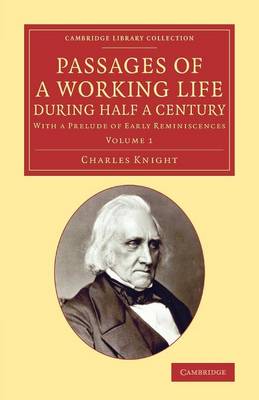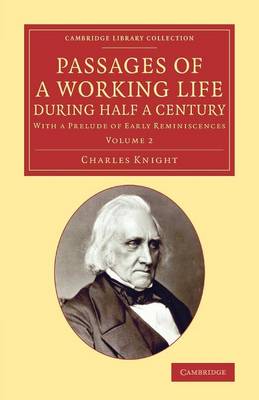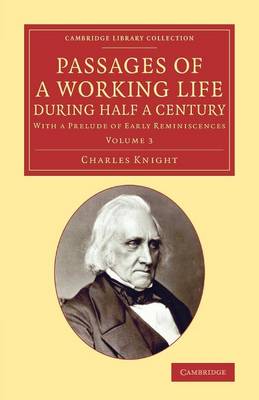Passages of a Working Life during Half a Century 3 Volume Set
3 primary works
Volume 1
Charles Knight (1791–1873), the son of a Windsor bookseller, was apprenticed to his father at fourteen. He read widely and systematically, and began to buy, collect and sell rare books. He also worked as a journalist, and, on moving to London, set up as a publisher, then took to freelance writing, and acted as manager of the publications of the Society for the Diffusion of Useful Knowledge. In 1832, he launched the Penny Magazine, offering the working classes useful information, within a moral context of thrift and self-discipline. Knight continued to write - on Shakespeare, on Caxton, on English history - while at the same time being at the centre of the British publishing industry. His 1864–5 three-volume autobiography (reissued here in its posthumous 1873 edition) provides insights into the economics as well as the personalities of the mid-Victorian publishing world. Volume 1 covers Knight's life up to 1826.
Volume 2
Charles Knight (1791–1873), the son of a Windsor bookseller, was apprenticed to his father at fourteen. He read widely and systematically, and began to buy, collect and sell rare books. He also worked as a journalist, and, on moving to London, set up as a publisher, then took to freelance writing, and acted as manager of the publications of the Society for the Diffusion of Useful Knowledge. In 1832, he launched the Penny Magazine, offering the working classes useful information, within a moral context of thrift and self-discipline. Knight continued to write - on Shakespeare, on Caxton, on English history - while at the same time being at the centre of the British publishing industry. His 1864–5 three-volume autobiography (reissued here in its posthumous 1873 edition) provides insights into the economics as well as the personalities of the mid-Victorian publishing world. Volume 2 covers the 1820s to the late 1840s.
Volume 3
Charles Knight (1791–1873), the son of a Windsor bookseller, was apprenticed to his father at fourteen. He read widely and systematically, and began to buy, collect and sell rare books. He also worked as a journalist, and, on moving to London, set up as a publisher, then took to freelance writing, and acted as manager of the publications of the Society for the Diffusion of Useful Knowledge. In 1832, he launched the Penny Magazine, offering the working classes useful information, within a moral context of thrift and self-discipline. Knight continued to write - on Shakespeare, on Caxton, on English history - while at the same time being at the centre of the British publishing industry. His 1864–5 three-volume autobiography (reissued here in its posthumous 1873 edition) provides insights into the economics as well as the personalities of the mid-Victorian publishing world. Volume 3 covers the 1850s, and continues up to 1865.


